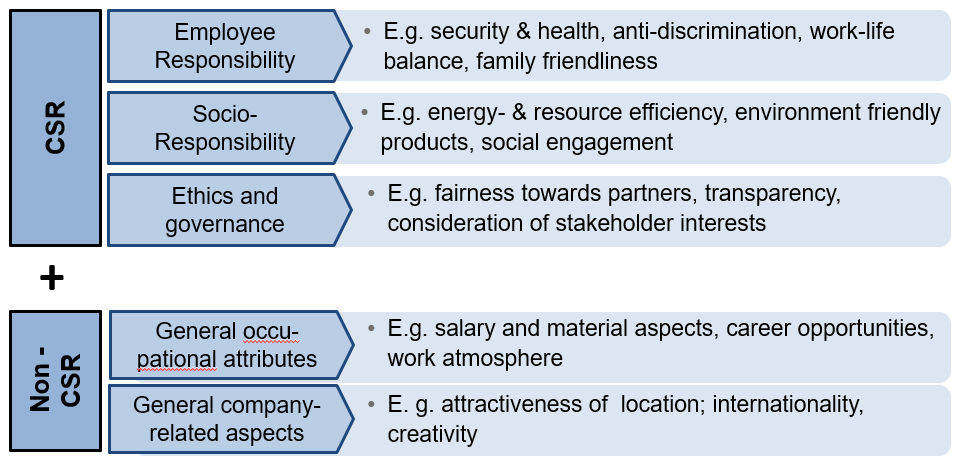GEP
Background
- Which employer attributes are most important to the next generation of employees worldwide?
- Which role do different aspects of CSR play in comparison to other non-CSR attributes?
- Which fields of CSR are most significant to young job seekers
across the globe?
- Do nationality,
demographic and experience variabales, values and general socio-economic and cultural variables influence preferences for CSR and non-CSR attributes?
- If CSR is important to young job-seekers – what is the reason for it?
Figure 1: CSR and non-CSR dimensions
Source: Bustamante et al. (2021a)
Table 1: Sample.

Source: GEP project data
Findings
Overall the concern for most CSR attributes (especially those related to socio-ecological responsibility and governanance and ethics) is low. Variance analysis suggests that there are significant differences in employer-related preferences of young job seekers with different nationalities. There also seem to be correlations between selected socio-economic indicators as well as individual values. Contextual country specific variables can explain some of the variations in CSR preferences between nationalities.
The GEP project showed, that also on a global basis the concern for most CSR attributes (especially those related to socio-ecological responsibility) is, in general, low. However, individual and contextual variables seem to have an impact on preference profiles of jobseekers. Some of the results obtained are summarized below (see also figure 2 and 3 below, Bustamante et al. 2021a):
- Attributes related to socio-ecological responsibility rank low, those related to employee responsibility rank high for most respondents.
- Work atmosphere is, on average, the highest ranking attribute.
- There are significant differences in means in the importance attached to CSR- and non-CSR related attributes between countries.
- Socio-demographic variables (e.g. gender, study programme) and individual values (e.g. universalism) are correlated with the importance attached to selected attributes
- The general cultural and socio-economic context has explanatory power for CSR- and non- CSR preferences.
A country specific analysis about the role for values for employer attractiveness in Germany revealed, that selected values, especially those indicating a concern for the welfare of others and the environment positively affect the importance of most CSR attributes while more selfish value orientations have a negative effect (see Bustamante et al. 2021b).
Figure 2: Average relative utilities for CSR and non-CSR attributes
Source: Modified from Bustamante et al. (2021a)
Figure 3: Nationality-based spread between maximum and minimum utility values for five CSR and non-CSR dimensions.
Modified from Bustamante et al. (2021a)
A book publication with information about the research procedure, the global results and country vignettes as well as an article about the global results is in preparation (Bustamante et al., 2021a).
For results on the impact of values in preferences (German sample) an article will be published in 2021 (Bustamante et al., 2021b).
First findings were also shown at a number of CSR conferences (e.g. the iCSR conference 2017 in Berlin and the CRRC conference 2017 in Sevilla).
References
Bustamante, S., Pizzutilo, F., Martinovic, M. & Herrero, S. (2021a) (expected). Corporate Social Responsibility and Employer Attractiveness - An International Perspective. Springer.
Bustamante, S., Pelzeter, A., Ehlscheidt, R., Deckmann, A. & Freudenberger, F. (2021b) (forthcoming). "The Effect of Values on the Attractiveness of Responsible Employers for Young Job Seekers." The Journal of Human Values (special issue "On Business and Benevolence") 27(1).
House, R. J., Hanges, P. J., Javidan, M., Dorfman, P. W., & Gupta, V. (2004). Culture, Leadership, and Organizations: The GLOBE Study of 62 Societies. Thousand Oaks: Sage Publications.
Sawtooth (2007): Technical paper series. The ACA/Web v6.0. Washington.
Schwartz, S. H. (2003): A Proposal for Measuring Value Orientations across Nations. In ESS (eds.) Questionnaire Development Package of the European Social Survey, pp. 259–319.
©2020 Silke Bustamante


